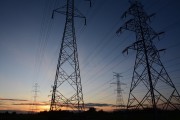These days, there is no shortage of discussion about energy in Canada, but the conversations and headlines typically focus on controversial projects like pipelines and fracking. Rarely do we talk about success stories that are good for the environment, the economy and energy customers.
Amid debates on energy development, Nova Scotia has quietly emerged as a Canadian leader when it comes to reducing energy waste. As discussions about a national energy strategy continue across Canada, more eyes will turn to Nova Scotia for ways to reduce pollution, cut energy costs and drive economic development.
Nova Scotia climbed to the top quickly as a result of a number of best practices in energy efficiency. Though public consultations and engagement, the province has developed a unique energy efficiency program that works, and works well.
Efficiency Nova Scotia is Canada’s only regulated, non-profit energy efficiency utility that is independent from both government and the power generation utility. That means Efficiency Nova Scotia is entirely dedicated to saving energy, and it has a series of accountability measures to monitor its effectiveness.
Equally important is how Nova Scotia funds energy efficiency programs. It costs money to find and stop wasted energy, but if you didn’t save that energy, you would have to pay Nova Scotia Power to generate it. So it makes sense that ratepayers buying electricity also pay to find the savings. That’s why you see it on your electricity bill in the same way you pay for power from coal, natural gas and other resources. The good news is that on average, energy efficiency costs only three cents per kilowatt hour saved, whereas generating coal or natural gas-fired electricity can cost anywhere from six to 15 cents per kilowatt hour.
Not only is energy efficiency a bargain up front, but it also has long-term and large-scale benefits. In fact, Nova Scotia ratepayers are getting a great return on their investments. In 2012, Efficiency Nova Scotia’s programs reduced electricity consumption by enough to power 16,000 homes annually, saving over $150 million in future electricity costs.
This level of savings is equal to a 1.5 per cent reduction in annual electricity demand, which makes the province the current national leader in energy savings. By comparison, electric energy efficiency programs in B.C. saved approximately 0.8 per cent in 2012, while Ontario and Manitoba both reduced demand by 0.6 per cent.
While Nova Scotia leads the way in Canada, it still has room to improve. Massachusetts — considered the leading jurisdiction in North America — recently adopted a three-year plan that requires electric utilities to reduce demand by 2.5 per cent this year, and increasing to 2.6 per cent in 2015. Rhode Island and Vermont have similar targets. In these states, there is broad support from Republicans and Democrats alike for investing in energy efficiency, because it saves ratepayers money while creating jobs and reducing pollution.
Nova Scotia has developed an innovative and successful model — nowhere else in Canada will you find an independent energy efficiency utility that is accountable directly to ratepayers. Efficiency Nova Scotia ensures that you do not have to spend any more than necessary on expensive electricity generation.
Going forward, organizations and governments across the country will keep looking to Nova Scotia for its expertise and leadership in this area. Nova Scotia should celebrate this success, and also take advantage of opportunities to build on it by investing more in efficiency.
Leslie Malone is the Canada program director at ENE, a non-profit organization that researches and advocates innovative policies that tackle our environmental challenges while promoting sustainable economies. Tim Weis is the director of renewable energy and efficiency policy at the Pembina Institute, a national clean energy think tank.







